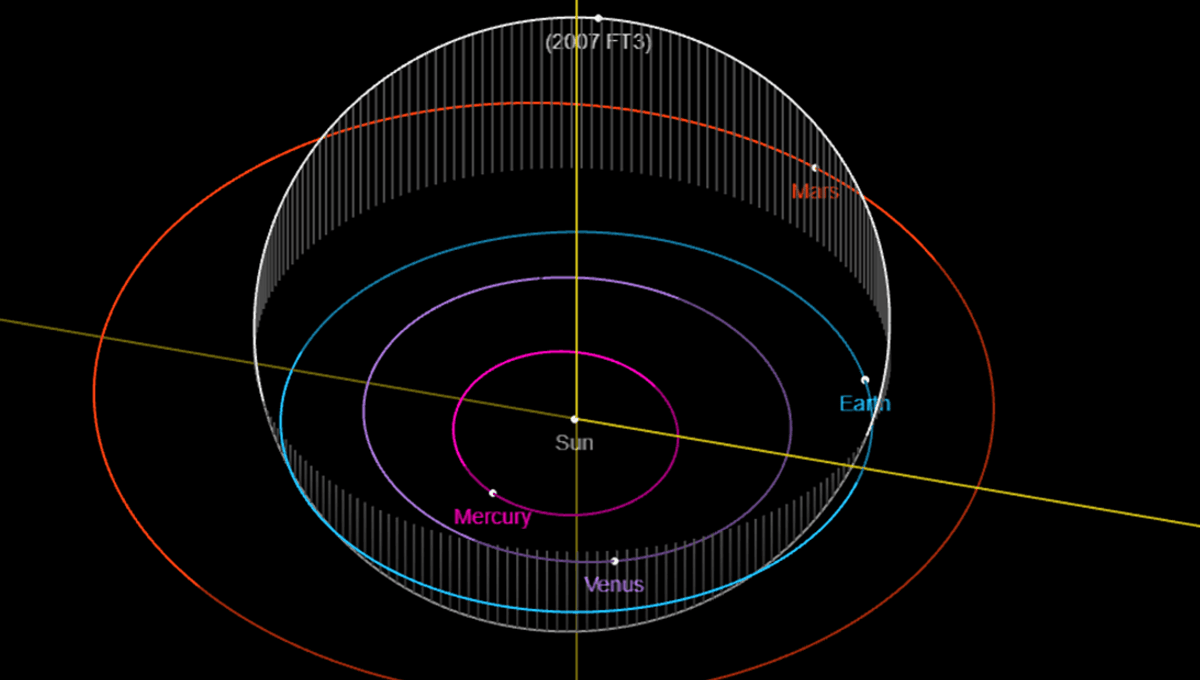
Several news outlets have reported that the Earth may be hit by a “lost” asteroid this year. According to the reports, if asteroid 2007 FT3 were to hit Earth it would do so with the equivalent energy of 2.6 billion tons of TNT, NASA has lost track it, and it has a chance of hitting the planet on October 5, 2024. So, given that that all sounds (to use a technical term) “not great”, what is really going on?
Well, 2007 FT3 is a real asteroid, first observed in 2007, and is on NASA’s Sentry Risk Table of objects that could potentially impact Earth. It is also a “lost” asteroid, as it was seen for just 1.2 days before disappearing from NASA’s view. Though the 314-meter (1,030 feet) asteroid became too faint and has not been seen since, it was observed at 14 points in its arc over these two days, allowing astronomers to calculate its orbit and look for potential collisions between Earth and it. Doing so, NASA’s Center for Near Earth Object Studies identified 89 potential impacts, including one on October 5, 2024.
Though that may sound a tad alarming, there really isn’t anything to worry about. One potential point of impact, or where the asteroid was supposed to be closest to Earth, took place in 2019. As you might have noticed, it didn’t. NASA and other observatories track the orbits of objects discovered in the Solar System, keeping a particular eye on “near Earth objects” 140 meters (460 feet) and larger in size that could cause devastation if they were to cross paths with Earth. So far, astronomers have been able to predict the orbits of known objects up to about 100 years in the future. The good news is that “no known asteroid larger than 140 meters in size has a significant chance to hit Earth for the next 100 years,” according to NASA.
Responding specifically to claims around 2007 FT3, NASA reiterated its response.
“There are no known asteroid impact threats to Earth at any time in the next century. Nasa and its partners diligently watch the skies to find, track, and categorize asteroids and near-Earth objects (NEOs), including those that may come close to Earth,” a NASA spokesperson told The Standard.
“An important note here is planetary scientists define asteroid approaches that come within 30 million miles of Earth’s orbit as close approaches. The larger an asteroid is, the easier it is for our planetary defense experts to find, meaning that their orbits around the sun are usually very well-known and understood for years or even decades.”
Should 2007 FT3 be found again in a sky survey or by astronomers trying to track its path, we can learn more about its orbit, perhaps enough to remove it from the list of potential Earth impactors, or, in the unlikely event that it should be heading our way, prepare a mission to deflect it.
Source Link: NASA Responds To Claims "Lost" Asteroid 2007 FT3 Will Hit Earth In 2024